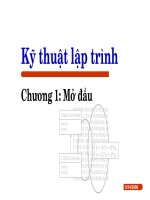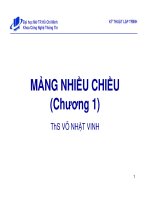Kỹ thuật lập trình hệ cơ điện tử= programming engineering in mechatronics chapter ii modular programming in c++
Bạn đang xem bản rút gọn của tài liệu. Xem và tải ngay bản đầy đủ của tài liệu tại đây (2.34 MB, 132 trang )
TRƯỜNG ĐẠI HỌC BÁCH KHOA HÀ NỘI
KỸ THUẬT LẬP TRÌNH HỆ CƠ ĐIỆN TỬ
Programming Engineering in Mechatronics
Giảng viên: TS. Nguyễn Thành Hùng
Đơn vị: Bộ môn Cơ điện tử, Viện Cơ khí
Hà Nội, 2020
1
Chapter II. Modular programming in C++
• Structured programming relies on top-down design.
• In C and C++ languages, the smallest structural unit having
independent functionality is called function.
• If functions or a group of functions belonging together are
put in a separate module (source file), modular
programming is realised.
• Structural programming also contributes to creating new
programs from achieved modules (components) by bottomup design.
• This chapter aims to introduce the modular and procedural
programming in C++.
2
Chapter II. Modular programming in C++
❖ The basics of functions
❖ How to use functions on a more professional level?
❖ Namespaces and storage classes
❖ Preprocessor directives of C++
3
Chapter II. Modular programming in C++
❖ The basics of functions
❖ How to use functions on a more professional level?
❖ Namespaces and storage classes
❖ Preprocessor directives of C++
4
The basics of functions
❖ Defining, calling and declaring functions
❖ The return value of functions
❖ Parametrizing functions
❖ Programming with functions
5
The basics of functions
• In C++, a function is a unit (a subprogram) that has a name and that can
be called from the other parts of a program as many times as it is
needed.
• In order to use a function efficiently, some of its inner variables
(parameters) are assigned a value when the function is called.
• When a function is called (activated), the values (arguments) to be
assigned to each parameter have to be passed in a similar way.
• The called function passes control back to the place where it was called
by a return statement.
• The value of the expression in the return statement is the return
value returned back by the function, which is the result of the function
call expression.
6
The basics of functions
❖ Defining, calling and declaring functions
•
C++ Standard Library provides us many useful predefined
functions.
function
header file
sqrt()
isalpha()
atoi()
rand()
cmath
cctype
cstdlib
cstdlib
strlen()
wcslen()
cstring
cwchar
7
The basics of functions
❖ Defining, calling and declaring functions
•
The general form of a function definition is the following (the
signs 〈 〉 indicate optional parts):
Function definition
8
The basics of functions
❖ Defining, calling and declaring functions
9
The basics of functions
❖ Defining, calling and declaring functions
•
The steps of calling a function
function_name (〈argument 1 , argument 2 , … argument n 〉)
Steps of calling a function
10
The basics of functions
❖ Defining, calling and declaring functions
•
C++ standards require that functions have to be declared before
they are called.
Function declaration
Function definition
11
The basics of functions
❖ Defining, calling and declaring functions
•
The complete declaration of a function (its prototype ):
return_value function_name(〈parameter declaration list〉);
return_value function_name(〈type_list〉);
declaration
C interpretation
C++ interpretation
type funct();
type funct(...);
type funct(void);
type funct(...);
type funct(...);
type funct(...);
type funct(void);
type funct(void);
type funct(void);
12
The basics of functions
❖ Defining, calling and declaring functions
•
C++ makes it possible that a parameter list containing at least one parameter
should end with three dots (...).
•
The transferring (throw) of exceptions to the caller function can be enabled or
disabled in function header
return_type function_name (〈parameterlist〉) 〈throw(〈type_list〉)〉
{
〈local definitions and declarations〉
〈statements〉
return 〈expression〉;
}
13
The basics of functions
❖ The return value of functions
•
The return_type figuring in the definition/declaration of a function
determines the return type of the function, which can be of any C++ type with
the exception of arrays and functions.
14
The basics of functions
❖ The return value of functions
•
By using the type void, we can create functions that do not
return any value.
15
The basics of functions
❖ The return value of functions
•
Functions can return pointers or references
16
The basics of functions
❖ Parametrizing functions
•
A parameter can be scalar (bool, char, wchar_t, short, int, long, long long,
float, double, enumeration, reference and pointer) or structure, union, class
or array.
The general form of polynomials:
Horner's scheme
17
The basics of functions
❖ Parametrizing functions
▪
Parameter passing methods
•
Passing parameters by value
18
The basics of functions
❖ Parametrizing functions
▪
Parameter passing methods
•
Passing parameters by value
19
The basics of functions
❖ Parametrizing functions
▪
Parameter passing methods
•
Passing parameters by reference
20
The basics of functions
❖ Parametrizing functions
▪
Parameter passing methods
•
Passing parameters by reference
21
The basics of functions
❖ Parametrizing functions
▪
Parameter passing methods
•
Passing parameters by reference
22
The basics of functions
❖ Parametrizing functions
▪
Using parameters of different types
•
Arithmetic type parameters
23
The basics of functions
❖ Parametrizing functions
▪
Using parameters of different types
•
Arithmetic type parameters
24
The basics of functions
❖ Parametrizing functions
▪
Using parameters of different types
•
User-defined type parameters
25









